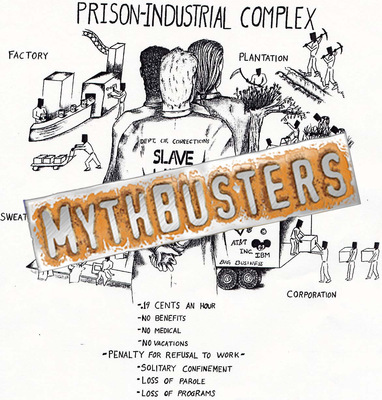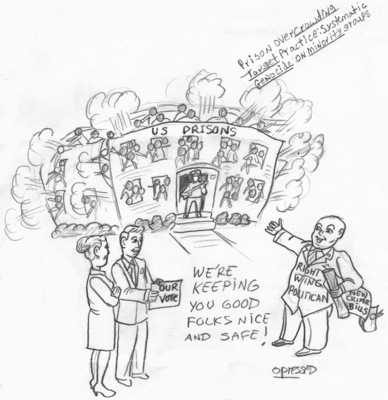
The Myth of the "Prison Industrial Complex"

Many people are caught up in the line that millions are enslaved in
this country, and that the main motivating factor behind the prison boom
of recent decades is to put prisoners to work to make money for
corporations or the government. MIM(Prisons) has clearly shown that
U.S.
prisons are not primarily (or even significantly) used to exploit
labor, and that they are a great cost financially to the
imperialists, not a source of profit.(1)
“Indeed, at peak use around 2002, fewer than 5,000 inmates were employed by private firms, amounting to one-quarter of one per cent of the carceral population. As for the roughly 8% of convicts who toil for state and federal industries under lock, they are ‘employed’ at a loss to correctional authorities in spite of massive subsidies, guaranteed sales to a captive market of public administrations, and exceedingly low wages (averaging well under a dollar an hour).”(2)
Instead, we argue that there is a system of population control (including all the elements of the international definition of genocide) that utilizes methods of torture on mostly New Afrikan and Latino men, with a hugely disproportionate representation of First Nation men as well, across this country on a daily basis. As the new prison movement grows and gains attention in the mainstream, it is of utmost importance that we maintain the focus on this truth and not let the white nationalists define what is ultimately a struggle of the oppressed nations.
To analyze why the term “prison industrial complex” (“PIC”) is inaccurate and misleading, let’s look at some common slogans of the social democrats, who dominate the white nationalist left. First let’s address the slogan “Welfare not Warfare.” This slogan is a false dichotomy, where the sloganeer lacks an understanding of imperialism and militarism. It is no coincidence that the biggest “welfare states” in the world today are imperialist countries. Imperialism brings home more profits by going to war to steal resources, discipline labor, and force economic policies and business contracts on other nations. And militarism is the cultural and political product of that fact. The “military industrial complex” was created when private industry teamed up with the U.$. government to meet their mutual interests as imperialists. Industry got the contracts from the government, with guaranteed profits built in, and the government got the weapons they needed to keep money flowing into the United $tates by oppressing other nations. This concentration of wealth produces the high wages and advanced infrastructure that the Amerikan people benefit from, not to mention the tax money that is made available for welfare programs. So it is ignorant for activists to claim that they are being impoverished by the imperialists’ wars as is implied by the false dichotomy of welfare vs. warfare.
Another slogan of the social democrats which speaks to why they are so eager to condemn the “PIC” is “Schools not Jails.” This slogan highlights that there is only so much tax money in a state available to fund either schools, jails, or something else. There is a limited amount of money because extracting more taxes would increase class conflict between the state and the labor aristocracy. This battle is real, and it is a battle between different public service unions of the labor aristocracy. The “Schools not Jails” slogan is the rallying cry of one side of that battle among the labor aristocrats.
Unlike militarism, there is not an imperialist profit interest behind favoring jails over schools. This is precisely why the concept of a “PIC” is a fantasy. While the U.$. economy would likely collapse without the spending that goes into weapons-related industries, Loïc Wacquant points out that the soft drink industry in the United $tates is almost twice as big as prison industries, and prison industries are a mere 0.5% of the gross domestic product.(2) Compared to the military industrial complex, which is 10% of U.$. GDP, the prison system is obviously not a “complex” combining state and private interests that cannot be dismantled without dire consequences to imperialism.(3) And of course, even those pushing the “PIC” line must admit that over 95% of prisons in this country are publicly owned and run.(4)
Federal agencies using the prison system to control social elements that they see as a threat to imperialism is the motivating factor for the injustice system, not an imperialist drive for profits. Yet the system is largely decentralized and built on the interests of the majority of Amerikans at the local level, and not just the labor unions and small businesses that benefit directly from spending on prisons. We would likely not have the imprisonment rates that we have today without pressure from the so-called “middle class.”
Some in the white nationalist left at times appears to dissent from other Amerikans on the need for more prisons and more cops. At the root of both sides’ line is the belief that the majority of Amerikans are exploited by the system, while the greedy corporations benefit. With this line, it is easy to accept that prisons are about profit, just like everything else, and the prison boom can be blamed on the corporations’ greed.

In reality the prison boom is directly related to the demands of the
Amerikan people for “tough on crime” politicians. Amerikans have forced
the criminal injustice system to become the tool of white hysteria. The
imperialists have made great strides in integrating the internal
semi-colonies financially, yet the white nation demands that these
populations be controlled and excluded from their national heritage.
There are many examples of the government trying to shut down prisons
and other cost-saving measures that would have shrunk the prison system,
where labor unions fought them tooth and nail.(1) It is this continued
legacy of national oppression, exposed in great detail in the book
The
New Jim Crow, that is covered up by the term “Prison Industrial
Complex.” The cover-up continues no matter how much these
pseudo-Marxists lament the great injustices suffered by Black and Brown
people at the hands of the “PIC.”
This unfortunate term has been popularized in the Amerikan left by a number of pseudo-Marxist theorists who are behind some of the popular prison activist groups on the outside. By explicitly rejecting this term, we are drawing a clear line between us and the organizations these activists are behind, many of whom we’ve worked with in one way or another. For the most part, the organizations themselves do not claim any Marxist influence or even a particular class analysis, but the leaders of these groups are very aware of where they disagree with MIM Thought. It is important that the masses are aware of this disagreement as well.
It is for these reasons that MIM(Prisons) passed the following policy at our 2012 congress:
The term “Prison Industrial Complex (PIC)” will not generally be used in Under Lock & Key because the term conflicts with MIM(Prisons)’s line on the economic and national make up of the U.$. prison system. It will only be printed in a context where the meaning of the term is stated by the author, and either criticized by them or by us.
Related Articles:This article referenced in:
- The Importance of Militarism Under Imperialism, and Why Prisons Aren't So Much
- Delaware Prison System Exposed as Tool of Social Control
- Use Economics as a Weapon for Revolution
- Book Review: Captive Genders
- Angola Louisiana Warden Making Money on Prisons
- Labor Aristocracy and White Nationalism Benefit from Prisons, not Private Corporations
- The Politics of Mass Incarceration








